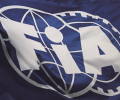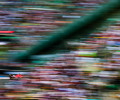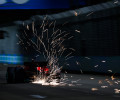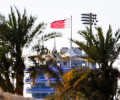F1 - Abu Dhabi GP: Conference 2

TEAM REPRESENTATIVES – Andrew GREEN (Force India), Antonio CUQUERELLA (HRT), Rémi TAFFIN (Renault Sport F1), Ross BRAWN (Mercedes), Pat FRY (Ferrari)
A question to you all about engines at this stage. It gets towards the sharp engine of the season and people are running out of mileage on their engines. Perhaps you could give us an update on how you are with engines at this stage?
Andrew GREEN: We’re completely to plan. As we worked it out from race one, so no issues for us at the moment.
Antonio?
Antonio CUQUERELLA: Yes, same for us. We’re going to start this race, both cars with the last engine and it's all according to plan as we planned in the winter.
Pat?
Pat FRY: Yes, exactly the same really. It’s going to plan. I think we have one engine left to play but touch wood it should be fine.
Ross.
Ross BRAWN: As with everyone else, you manage it through the whole season. So you’re making adjustments and corrections as you go through the year and we’re OK.
Rémi, your teams?
Remi TAFFIN: Let’s say since last race we're on plan. We’ve obviously had up and downs during the year but we’re all fine. We also have some engines left obviously for six of our eight drivers, one left, which we should use for this weekend. So it will be up to eight this weekend for all our customers and we should be OK for the rest of the year. Obviously we have to manage the mileage on Fridays but yeah, we’re on target.
Andrew, first of all, Force India seems to be fairly comfortable in the midfield but what does it take to get the team towards the sharper end of the championship?
AG: Quite simple: you’ve got to out-develop the guys in front of you.
Is that money? Is that personnel?
AG: It’s everything. But ultimately you need the money to invest in the team, in the hardware and in the people and ultimately that will increase your rate of development. That’s what you need to do, that’s what we would need to do if we were to start to target these guys in front of me [Fry, Brawn]. It’s something we’ve discussed with the shareholders at great length, telling us where they want to be, what they want to do. There’s more discussions happening very shortly and hopefully we’ll be able to announce something in near future.
Have you still got developments coming this year or are you working one hundred per cent on the new car now?
AG: Oh, we’ve been on the new car for several months now. There’s been no development on this car since the shutdown effectively.
Antonio, can you give us an update on how the team is developing in Madrid, in terms of staffing etc.,
AC: Yeah. As you know we’ve done a big change this year, moving everything, everybody’s under the same roof now and we got our DO [design office] as it started from the summer and now our department is moving from Germany to Spain. We are recruiting, we are doing a lot of interviews and we are recruiting at a high rate of people. But still we are the smallest team, there’s no need to hide that. It’s a long way for us to get into the midfield, or let’s say the average size of team. But we are growing fast.
In terms of development of the car for next year, is it going to be essentially the same car?
AC: Oh no. It’s not going to be the same car. It’s going to have… all the cars they have a lot of common parts that carry over from one to the other but of course it’s going to be completely new in many areas: suspension, aerodynamics and many areas. Of course some parts of the transmission are parts we are going to keep them but I would say all the parts that are lap time-relevant are going to be improved or replaced.
Pat, I think you made quite a big push for this grand prix in terms of developments. Can you give us some sort of update on it?
PF: We’ve been pushing for the last few grands prix really. There’s a few new developments on the car; we worked through our programme this morning and this afternoon, looking promising but we need to analyse all the data as normal before we decide what to run for tomorrow.
How much did you change your schedule to bring those parts to here? Is it something that’s recently come in? And how much has that been affected by the shutdown of the wind tunnel?
PF: Well, we’re still using our wind tunnel. We’re obviously using a customer one as well. I mean it’s just been part of our normal tunnel programme if you like, and I suppose we are a little bit later this year than we were last year with the new car but development on that has been going strong for quite a while as well.
Q: Ross, obviously the announcement that Niki Lauda will have a role within the team has been of interest? How is that going to work with you?
RB: Niki is non-executive chairman, chairman of our board. We meet our board several times a year, to discuss the major issues. I think Niki is also going to add a lot of racing experience to the board. The board meetings will probably have a slightly different complexion in the future. And Niki's helping with some of the bigger strategic issues, such as the new commercial agreement with Bernie; obviously Niki had some involvement with persuading Lewis to join us - so those sort of issues but not involved with the day-to-day running of the team.
Q: So your role essentially doesn't change.
RB: No, no. I've just a got a new chairman. I had one before, I've got a different one now.
Q: You touched there on Lewis joining the team, to what extent would you encourage him to build the team around him, rather as Michael Schumacher did at Ferrari all those years ago? And how would that therefore work with the other driver?
RB: Well, I think both drivers in the team contribute to developing a team, building a team. We are clearly not achieving the results we want to achieve yet, so we've got some progress we need to make and I think Lewis will be able to contribute a lot to helping us make that progress. We obviously believe and we know he's a very very quick driver. This is perhaps a new challenge he's facing of helping a team grow and develop and become more competitive. So there's some different aspects, perhaps, to what he's going to face with us and what he's faced at McLaren, which was a pretty complete and rounded team.
Q: Remy, first of all, interesting developments from Lotus with the Coanda exhaust; how does that affect the Renault engine? What do you have to do to the engine with different exhaust systems?
RT: Obviously that affects the performance of the engine so get the performance down from the first attempt of the exhaust. Thereafter, we have to work on how we can assess this loss and try to minimise it, so that's our main objective when we work on this exhaust back at the factory. That's why you can see some different versions coming at any race we do, so that's the part of the job we do.
Q: And here, how much is the performance of the engine affected from free practice in the morning, through to qualifying or the race, the difference in temperature, 13 degrees track temperature, but how much does the ambient change affect the engine and performance?
RT: If we look at what we're going to get at the end of the race, it could be five to 10 degrees down. Engine-wise it's more like what we're going to try to assess for the cooling, for example, so we just basically have to get the data from P2 because it's more or less the same timing, and assess the set-up of the car, we need to get with it, and that's basically it. Racing is pretty close to what we've been doing in P2 so that's when we will get the data and find out what we need.
Q: Is there a power change at all?
RT: Obviously there will be a power change, but let's say it's the same for everyone. The only real change that we have from Friday to Saturday or Sunday is the engine change, because we're going to change the engine for tomorrow, so that's going to be the main difference.
QUESTIONS FROM THE FLOOR
Q: (Alan Baldwin - Reuters) Ross, the FIA has published the entry fee requirements for next season with a significant increase in the amount for every point scored, which is probably going to hit the mid-table teams more than others. I was just wondering about your thoughts on that? Mercedes, presumably, can afford to pay it but it's quite a significant increase on this season.
RB: I think, for us, we would be delighted to pay it because we would be scoring a lot of points. In fact, if you're a mid-range team, and considering the fact that all the extra facilities that we pay for separately at the moment are rolled into that entrance fee, I think for a lot of teams it's going to be very similar. It's going to make more substantial difference for those teams who finish in the top three or four of the championship. I was being a bit flippant, but obviously I hope that we can have that problem next year.
Q: (Luigi Perna - La Gazzetta dello Sport) Pat, are you confident you can reduce the gap from Red Bull in qualifying or do you think you will suffer again as you have in the last races?
PF: We are trying as hard as we can to improve the qualifying performance. As I say, we've got some updates here. I need to go through... or the guys need to go through and check the exact performance level, but obviously our race pace is quite reasonable, as last weekend showed. We need to work on our qualifying, so we will keep on trying, we will keep on pushing.
Q: (Kate Walker - Girl Racer) A question for Remy: we understand that the new Red Bull or the new Renault alternators are going to be seen in Austin for the first time; could you tell us what work has been done to integrate them on the engines and what the differences are with the new specification?
RT: The new specification we've been running now since Singapore. It was obviously run on Fridays but before we did that, we did the normal job we do with any parts that we fit on the engine on the dyno, for example, so it has obviously passed all the tests, so we are now quite confident that we can race it and that's why we have a target to introduce that at race 19, so in Austin. The question now is whether we're going to fit that on all of the cars or all of the teams we supply and it's just a question of supplying the parts. It's not that easy to get all the parts changed but obviously the major changes we've done is all about what failed and we've discussed bearings so that's the work we've achieved so far, so that's where we are.
Ends

 Facebook
Facebook Twitter
Twitter





